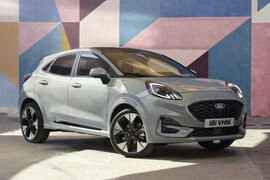 UK boss Lisa Brankin warns 2025 goals will be "even harder" to hit unless incentives are forthcoming
UK boss Lisa Brankin warns 2025 goals will be "even harder" to hit unless incentives are forthcoming
Ford won’t restrict sales of its combustion models in order to hit the UK’s emissions targets, even though next year’s more stringent rules will be “even harder” to achieve, the car maker’s UK boss has told Autocar.
Lisa Brankin also sent a warning to the UK government that unless incentives arrive as part of the upcoming consultation in the zero-emission vehicles (ZEV) mandate – announced last week – hitting future targets will be “unsustainable” .
Under the current mandate, 22% of a car maker’s total UK sales must be EVs, a target that will rise to 28% in 2025, then incrementally to 80% by 2030, at which point new non-electrified cars will be banned from sale. For each model sold below that target figure, a £15,000 fine is issued.
Showing the scale of the task needed, Ford this year is on course to miss the government’s mandate target by 15%, a figure that is also well below the market’s 18% average.
Next year should be easier for the US firm, given that it now has a four-model EV line-up following the recent launches of the Capri, Explorer and, today, the Puma Gen-E, but 2025 will still be “a challenge”, said Brankin.
Asked if the brand would therefore throttle back ICE sales in order to hit the 28% sales mix, Brankin said: “Success for us is selling EVs and that’s what we want to focus on. Our position is not that we’ll turn off the tap of ICE vehicles.”
To sell EVs, however, buyers must be given incentives, she said. “If you look at fleets, with benefit-in-kind taxation incentives, the [EV] sales mix for us is 45%, so it shows what we could see with wider incentives,” said Brankin.
She added that Ford is already applying heavy discounts to models just so it can hit current sales numbers, but “to push further to hit the ZEV targets” is “not sustainable”.
“We need some government incentives to promote momentum in the market,” she warned.
Last week’s announcement that ministers are willing to redraw the ZEV mandate is a potential beacon of hope although the departure of Louise Hague as transport minister just a few days later throws January’s consultation target into doubt, she said. Brankin now “doesn’t know” if incentives will be forthcoming.
Remaining positive, she added: “I think it's really positive that government's listened, and it's really positive that we've got a consultation. I just really hope that we can get incentives and that we can get something quickly.
“The fundamental issue is that customer demand is not at the level of the ZEV mandate. We need to work on making it a more practical piece of legislation. But ultimately the issue the government has got to address is incentives.”
Another aspect of the mandate she would like to see amended is combining targets for retail cars and commercial vehicles (CVs). Currently, CVs are required to hit a sales mix of 10% for EVs, rising to 16% next year. Ford, which leads the segment with the Transit, Transit Custom and Ranger, is sitting just below this year’s goal. “I think it would be really helpful to have the targets combined and [that] will just give us a little bit more flexibility,” said Brankin. But she added that “the reality is it is still a real challenge” to hit targets for CVs.
Hans Schep, Europe boss of the brand’s commercial arm, Ford Pro, agrees, adding that the government needs to help the business because it is not “a philanthropist”. Warning about hitting next year’s targets, he said: “We've got a plan to hit it, but there's a lot of balancing going on. The market is not fully there yet. We need government support.”
One criticism aimed at Ford is that its electric car offerings, from the Mustang Mach-E to the Capri, sit in a similar space, which could hinder sales. Brankin disagreed: “I think in terms of size, they are similar, but in terms of style and what they offer, I think they appeal to different sets of customers. We're really excited to get them into the market and see what happens."
The importance of these cars being a success cannot be understated by Ford, said Brankin. Her comment follows news last week that Ford will cut 4000 jobs across Europe – 800 in the UK – due to concerns about the “health” of its passenger car business.